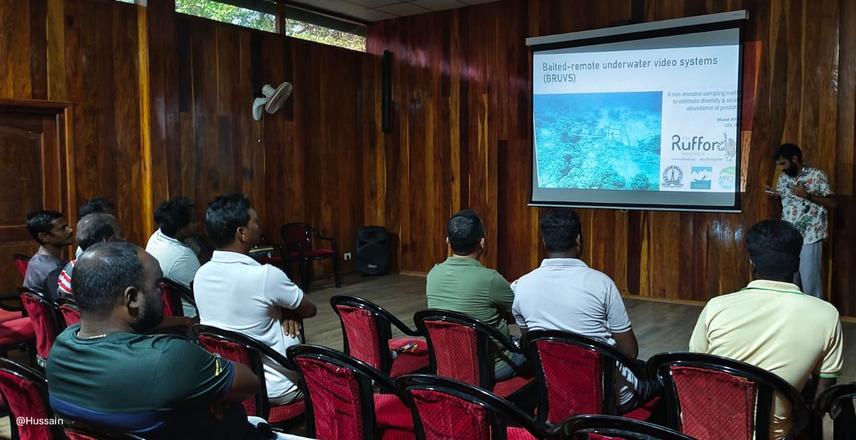Bharat Ahuja
Fisheries in the Andaman Islands are primarily small-scale and predator targeting. There is a limited understanding of the top-down effects of fisheries on the coral reefs that fringe these islands. Our aim is to fill this research gap by quantifying the effects of fishing on reef fish populations and their behaviour. Specifically, we aim to understand how predator assemblages change across a gradient of fishing pressure within and outside established Marine Protected Areas (MPAs).

Presentation. © Hussain.
Selective overfishing has been identified as a key factor in influencing the distribution and abundance of predators such as sharks, rays and groupers. The loss of these species can lead to trophic downgrading and have cascading impacts on local reef fish populations as well as coastal communities that depend on marine resources. Through this project, we aim to examine key top-down processes (such as commercial fishing) that are influencing reef community dynamics and vulnerable species in the Andaman Islands by using an integrated approach with a view to promote conservation, inform local management and impact island policies.
We also aim to quantify changes in grouping and foraging behaviour of herbivorous reef fish in response to declines in predator populations. We will employ a combination of Baited Remote Underwater Video Stations (BRUVS) and Underwater Visual Census (UVC) by SCUBA diving to quantify the abundance of species of interest and their behaviour(s). By comparing our findings within and outside MPAs, we aim to determine the efficacy of current management regimes, and to develop better management recommendations for preserving coral reefs and reef-associated fauna in the Andaman Islands. Finally, we will communicate our findings with local stakeholders to encourage their participation in our monitoring protocols. We will integrate our findings with their insights to develop a strong marine resource conservation paradigm into the islands’ sustainable development.